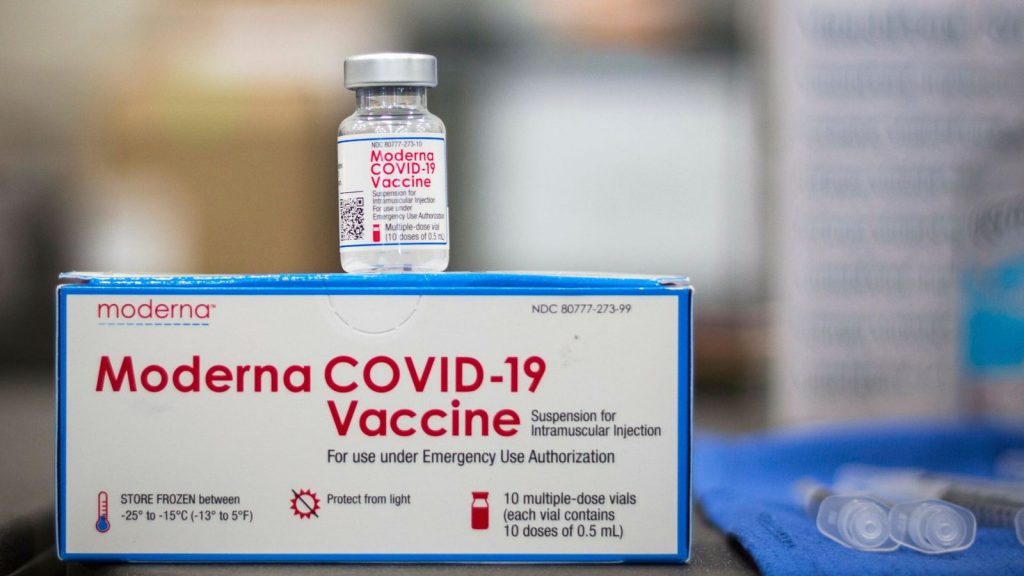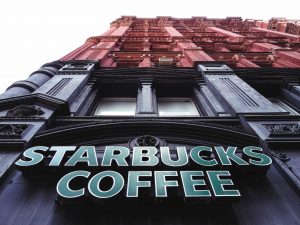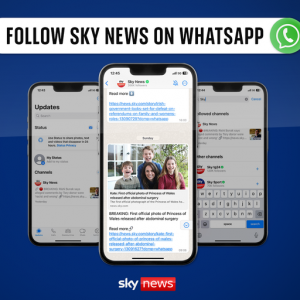Moderna sues Pfizer/BioNTech over COVID vaccine
Moderna is suing Pfizer and its German partner BioNTech for alleged patent infringement in the development of the first COVID-19 vaccine approved in the US.The lawsuit, which seeks undetermined monetary damages, alleges they copied technology that Moderna had developed years before the pandemic.
Moderna chief executive Stephane Bancel said: “We are filing these lawsuits to protect the innovative mRNA technology platform that we pioneered, invested billions of dollars in creating, and patented during the decade preceding the COVID-19 pandemic.”Mr Bancel said the company is continuing to use the technology to develop treatments for influenza and HIV, as well as autoimmune and cardiovascular diseases and rare forms of cancer.”We believe that Pfizer and BioNTech unlawfully copied Moderna’s inventions, and they have continued to use them without permission,” Moderna’s chief legal officer Shannon Thyme Klinger added.
Moderna Inc and the partnership of Pfizer Inc and BioNTech were two of the first groups to develop a vaccine for COVID.Just a decade old, Moderna had been an innovator in the messenger RNA (mRNA) vaccine technology, which works by teaching human cells how to make a protein that will trigger an immune response.
More on Covid-19
Related Topics:
The technology helped to speed up the approval process for the jabs – which usually takes years to complete – and enabled the vaccine to be developed so quickly.Germany-based BioNTech had also been working in this field when it partnered with the US pharma giant Pfizer.
Advertisement
The US Food and Drug Administration granted emergency use authorisation for the partnership’s vaccine first in December 2020 – giving the green light to Moderna’s jab a week later.Moderna alleges Pfizer/BioNTech, without permission, copied mRNA technology that it had patented between 2010 and 2016, well before COVID-19 emerged in 2019.Early in the pandemic, Moderna said it would not enforce its COVID patents to help others develop their own vaccines, but in March this year it told companies, such as Pfizer and BioNTech, that it expected them to respect its intellectual property rights.In revenue, Moderna’s vaccine has brought in $10.4 billion (£8.8bn) this year, while Pfizer’s has raised about $22 billion (£18.6bn).Pfizer/BioNTech ‘appropriated two types of intellectual property’, says Moderna In a statement issued on Friday, Moderna said Pfizer/BioNTech appropriated two types of intellectual property, one involved an mRNA structure and the other relates to the coding of a full-length spike protein.”Pfizer and BioNTech took four different vaccine candidates into clinical testing, which included options that would havesteered clear of Moderna’s innovative path,” the statement read.”Pfizer and BioNTech, however, ultimately decided to proceed with a vaccine that has the same exact mRNA chemical modification to its vaccine.”Pfizer and BioNTech are already facing multiple lawsuits from other companies who say the partnership’s jab infringeson their patents, but both have said they will defend their patents vigorously.Pfizer said the company had not been served and that they were unable to comment at this time.

Moderna is suing Pfizer and its German partner BioNTech for alleged patent infringement in the development of the first COVID-19 vaccine approved in the US.
The lawsuit, which seeks undetermined monetary damages, alleges they copied technology that Moderna had developed years before the pandemic.
Moderna chief executive Stephane Bancel said: “We are filing these lawsuits to protect the innovative mRNA technology platform that we pioneered, invested billions of dollars in creating, and patented during the decade preceding the COVID-19 pandemic.”
Mr Bancel said the company is continuing to use the technology to develop treatments for influenza and HIV, as well as autoimmune and cardiovascular diseases and rare forms of cancer.
“We believe that Pfizer and BioNTech unlawfully copied Moderna’s inventions, and they have continued to use them without permission,” Moderna’s chief legal officer Shannon Thyme Klinger added.
Moderna Inc and the partnership of Pfizer Inc and BioNTech were two of the first groups to develop a vaccine for COVID.
Just a decade old, Moderna had been an innovator in the messenger RNA (mRNA) vaccine technology, which works by teaching human cells how to make a protein that will trigger an immune response.
The technology helped to speed up the approval process for the jabs – which usually takes years to complete – and enabled the vaccine to be developed so quickly.
Germany-based BioNTech had also been working in this field when it partnered with the US pharma giant Pfizer.
The US Food and Drug Administration granted emergency use authorisation for the partnership’s vaccine first in December 2020 – giving the green light to Moderna’s jab a week later.
Moderna alleges Pfizer/BioNTech, without permission, copied mRNA technology that it had patented between 2010 and 2016, well before COVID-19 emerged in 2019.
Early in the pandemic, Moderna said it would not enforce its COVID patents to help others develop their own vaccines, but in March this year it told companies, such as Pfizer and BioNTech, that it expected them to respect its intellectual property rights.
In revenue, Moderna’s vaccine has brought in $10.4 billion (£8.8bn) this year, while Pfizer’s has raised about $22 billion (£18.6bn).
Pfizer/BioNTech ‘appropriated two types of intellectual property’, says Moderna
In a statement issued on Friday, Moderna said Pfizer/BioNTech appropriated two types of intellectual property, one involved an mRNA structure and the other relates to the coding of a full-length spike protein.
“Pfizer and BioNTech took four different vaccine candidates into clinical testing, which included options that would have
steered clear of Moderna’s innovative path,” the statement read.
“Pfizer and BioNTech, however, ultimately decided to proceed with a vaccine that has the same exact mRNA chemical modification to its vaccine.”
Pfizer and BioNTech are already facing multiple lawsuits from other companies who say the partnership’s jab infringes
on their patents, but both have said they will defend their patents vigorously.
Pfizer said the company had not been served and that they were unable to comment at this time.



